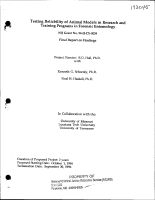Research programs
Detecting Concealed Weapons: Technology Research at the National Institute of Justice
National Institute of Justice: 1986-1987
Medical Panel Issues Interim Findings on Stun Gun Safety
Data Resources of the National Institute of Justice, Eighth Edition
Production of Criminological Experiments
Teen Dating Violence: Building a Research Program Through Collaborative Insights
New Facility Adds to University's Research Capability on Unmanned Aircraft Systems
JUSTNET Goes to College
View From the National Institute of Justice
Factors Influencing the Quality and Utility of Government-Sponsored Criminal Justice Research in the United States, 1975-1986
Sequential Processing of Documents for Fingerprints - A Technology Transition Workshop
Rethinking Program Fidelity for Criminal Justice
Syracuse University Team Uses Input From the Field To Develop New Technology
Testing Reliability of Animal Models in Research and Training Programs in Forensic Entomology
NIJ Marks 50 Years of Helping the Criminal Justice Community
Understanding Domestic Radicalization and Terrorism: A National Issue Within a Global Context
A Comprehensive School Safety Framework: Report to the Committees on Appropriations
TECHBeat, December 2017
Video: Law Enforcement and Research Partnerships
Video: Reducing Traffic Fatalities: NIJ LEADS Scholar Spotlight
Law Enforcement and Research Partnerships
Cory Haberman, Assistant Professor, University of Cincinnati, discusses his work as an NIJ LEADS Academic and the value of having training researchers working directly with law enforcement agencies.
See the YouTube Terms of Service and Google Privacy Policy
Reducing Traffic Fatalities – NIJ LEADS Scholar Spotlight
See the YouTube Terms of Service and Google Privacy Policy


